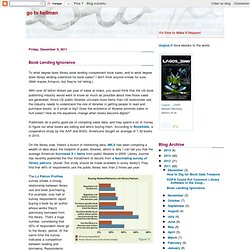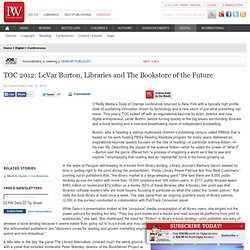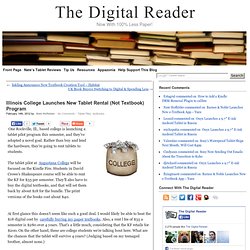

Duke University Press Launches New Platform for eBook Access, Powered by Highwire Press. 15-Day Free Trials on over 100,000 eTextbooks. Kno. Kno, Inc. is a software company that works with publishers to offer digital textbooks and other educational materials. [1] In November 2013, after raising nearly $100 million in venture capital, the company was acquired by Intel for $15 million.[2] History[edit] Founded in May 2009, Kno was headed by CEO Osman Rashid.,[3] the co-founder of Chegg, and CTO Babur Habib, a consumer electronics veteran. The firm received funding from Andreessen Horowitz,[4] Intel Capital, Goldman Sachs, FLOODGATE and GSV Capital, and was based in Santa Clara, California.
The company initially announced, in June 2010, a line of tablet computers[5] Its goal was to offer a "digital textbook/student platform" aimed at the academic market.[4] The textbook tablet was available either with a single panel 14.1" touchscreen or with dual 14.1" touchscreens.[6] The operating system was based on Linux and Webkit.[7] Products[edit] References[edit] External links[edit] Official Site.
Book Lending Ignorance. To what degree does library book lending complement book sales, and to what degree does library lending substitute for book sales?

I don't think anyone knows for sure. (Well maybe Amazon, but they're not telling.) With over 40 billion dollars per year of sales at stake, you would think that the US book publishing industry would want to know as much as possible about how those sales are generated. Since US public libraries circulate more items than US bookstores sell, the industry needs to understand the role of libraries in getting people to read and purchase books. Is it small or big?
Publishers do a pretty good job of compiling sales data, and they spend a lot of money to figure out what books are selling and who's buying them. On the library side, there's a bunch of interesting data. The LJ Patron Profiles survey shows a strong relationship between library use and book purchasing. So much is unknown, and so much is to be gained by knowing more.
eBooks and Textbooks of the Future. TOC 2012: LeVar Burton, Libraries and The Bookstore of the Future. O’Reilly Media’s Tools of Change conference returned to New York with a typically high profile slate of publishing innovation driven by technology and a new vision of just what publishing can mean.

This year’s TOC kicked off with an inspirational keynote by actor, director and now digital entrepreneur, LeVar Burton, before turning quickly to the big issues surrounding libraries and e-book lending and a new and breathtaking vision of independent bookselling. Burton, who is heading a startup multimedia children’s publishing venture called RRKidz that is based on his work hosting PBS’s Reading Rainbow program for many years, delivered an inspirational keynote speech focused on the role of reading—in particular science fiction—in his own life. While Genco’s presentation looked at the “voracious” media consumption of all library users, she singled out the power patrons for leading the way.
“They buy print books and e-books and read across all platforms from print to audiobooks,” she said. Illinois College Launches New Tablet Rental (Not Textbook) Program. One Rockville, Ill., based college is launching a tablet pilot program this semester, and they’ve adopted a novel goal.

Rather than buy and lend the hardware, they’re going to rent tablets to students. The tablet pilot at Augustana College will be focused on the Kindle Fire. Students in David Crowe’s Shakespeare course will be able to rent the KF for $35 per semester. They’ll also have to buy the digital textbooks, and that will set them back by about $18 for the bundle. The print versions of the books cost about $40. At first glance this doesn’t seem like such a good deal.
But one part that I particularly like are the book chosen by the professor. Cheap textbooks are near and dear to my heart this semester, and I wish that one of my professors had followed David’s lead. I’ve always thought that English departments should be the leading adopters of digital textbooks.